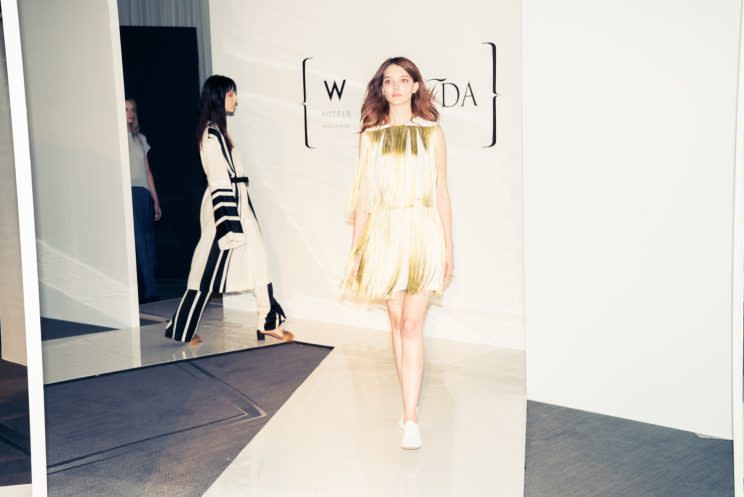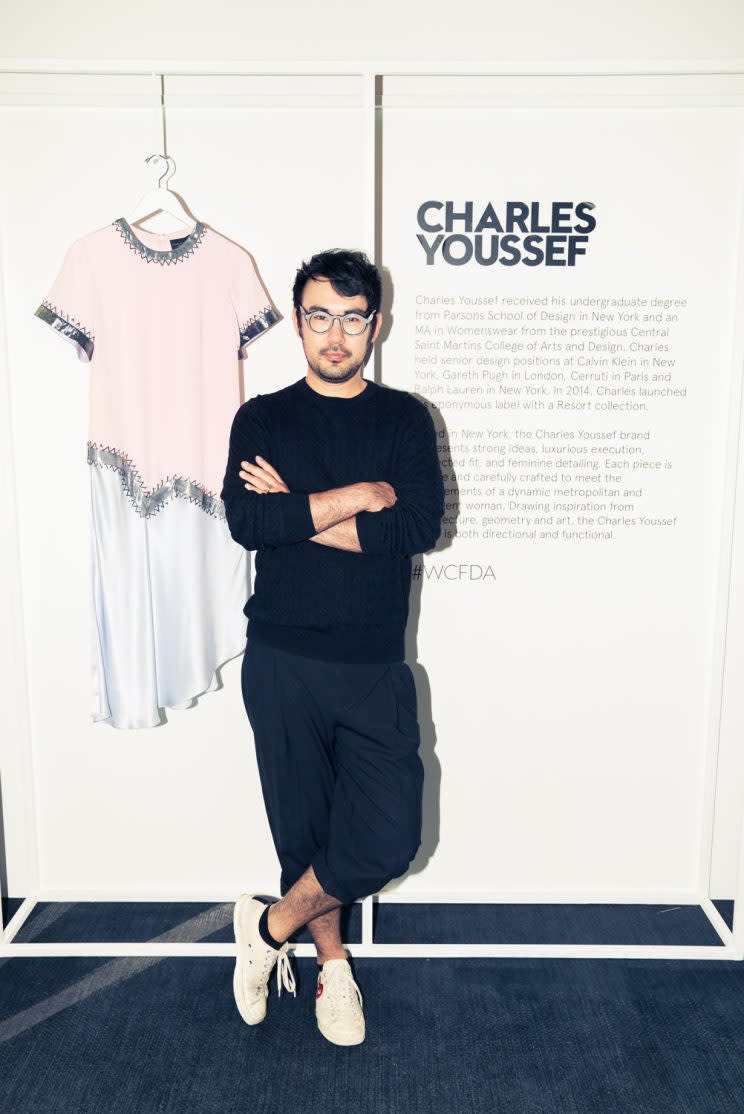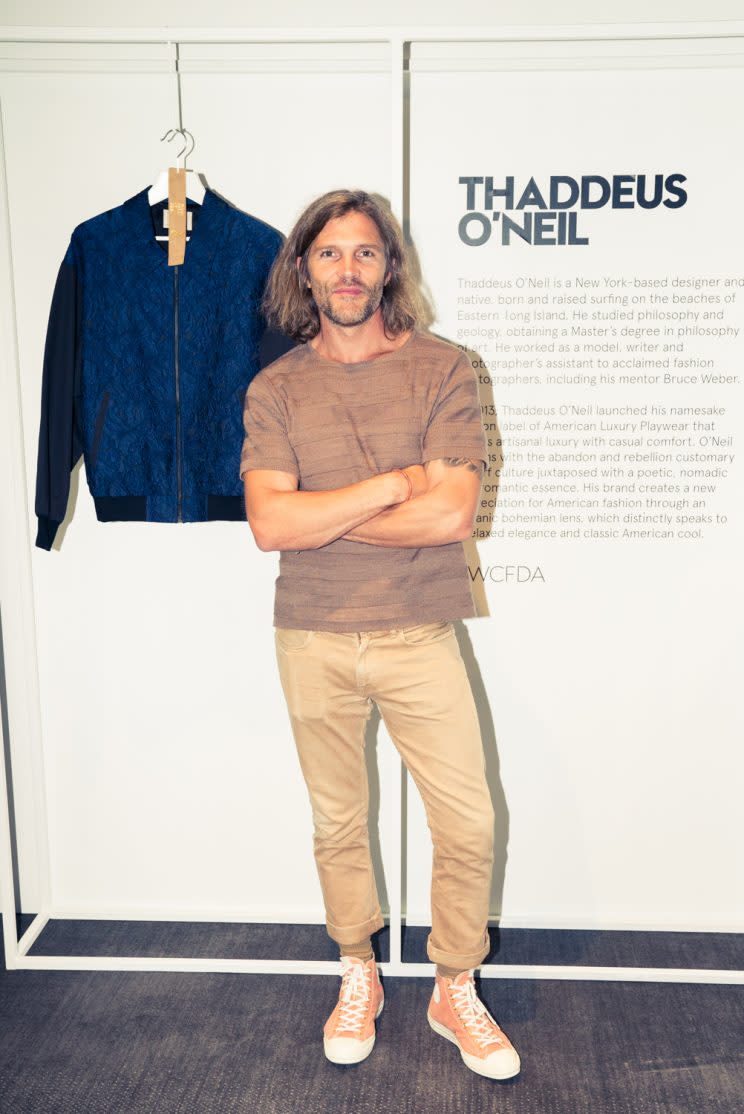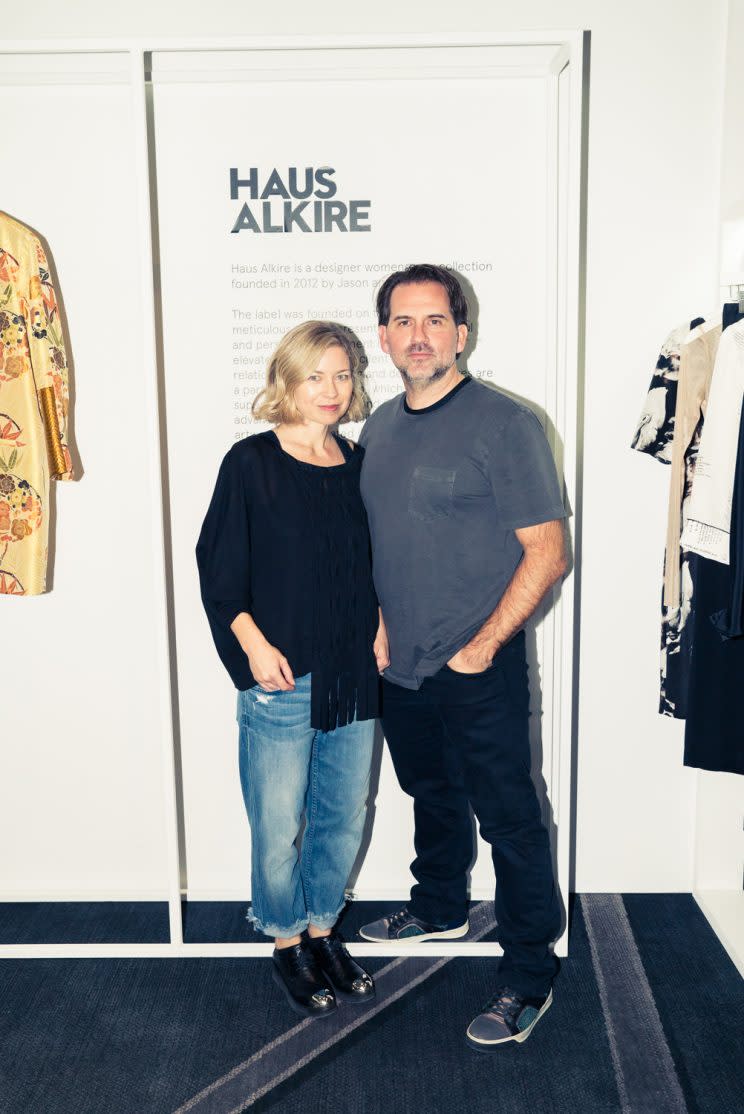These 6 Designers Are Changing the Way Fashion Does Business
Yesterday, we began our exploration into the CFDA’s Fashion Incubator program, which leads a group of 10 emerging American designers through an intensive two-year business development program. We spoke with the mastermind behind the program, CFDA President and CEO Steven Kolb, and with Suzanne Cohen of W Hotels, which provides participants with marketing support and far-flung inspiration trips. They shed light on how the program is strengthening the future of American fashion by giving its emerging designers a rock-solid business foundation in an unpredictable and ever-changing industry.
Today, we speak with the program’s participants – the six designers behind the labels Brother Vellies, Haus Alkire, Charles Youssef, Ji Oh, and Thaddeus O’Neil. On the night of their showcase at W Dallas Victory hotel before an audience of press, retail buyers, and fashion fans, the designers shared with Yahoo Style the struggles they face as emerging talent, their hopes for the future, and the crucial ways the Incubator is changing how they do business.
For many of the designers, that means rethinking old assumptions about what’s a must-do (like runway shows, or having tons of wholesale accounts), and instead getting laser-focused on who their customers are, and what smart growth looks like. Together, they’re proving there’s no longer just one way to succeed in fashion. Scroll on for what they’ve learned, and read part one of this series here.

Aurora James, designer of Brother Vellies
Yahoo Style: Your brand is only three years old, but already has a huge following among fashion obsessives, and on social media. How have you achieved that visibility?
Aurora James: Winning the Vogue/CFDA Fashion fund [in 2015] was such a huge coup for us, and helped enormously with visibility. But in the end, that only goes so far – you have to build a strong business or you’re not going to make it. The amazing thing about the Incubator is it supports us as entrepreneurs, not just as designers.
Is thinking about the business side of your brand a tough leap to make?
I spent my tween and toddler years running lemonade stands, so I always had that drive! But not everyone does, and that’s why not everyone wants to have their own label. There are so many incredible designers whose names you might not know, because they’re working for someone else, which is just as amazing, and even harder sometimes.
So you never wish you went that route?
Oh, every day, I’m like ‘Imagine if I worked for whoever, and got paid every two weeks, that would be uh-mazing!’ I think the smart people do that! To be a designer, you have to have creativity, some level of business acumen, and be a certain level of dumb. [laughs]
Steven Kolb told me he advises emerging designers to have one item that’s the focus of their brand – what is that for you?
I want Brother Vellies to be known for as a company that supports artisanal communities, and makes beautiful things in a beautiful way. We’re at the point now where we can no longer afford to be wasteful – and being wasteful is not luxury. Making something out of plastic is not luxury – I don’t care if it has two C’s on it. Having appreciation for fashion as an art form, knowing how it’s made, who made it, what the materials are, how they’re dyed – real fashion connoisseurs care about that stuff, not so much the trend of the moment. I hope I’m building the kind of brand that attracts that customer.

How are new people discovering your brand?
It’s really interesting, we get such a wide variety of press. For example, Better Homes and Gardens has given us just as much coverage as American Vogue – in fact, they covered me before Vogue did! So our customers are very diverse. The shoes hit a wide variety of people. A lot of my customers are moms, who know they can do it all and be it all, and want to be epic when they’re dropping off their kids in the morning.
That’s the dream, isn’t it?
Totally. When I think of Dallas, I think of Kimberly Chandler – she used to live here and is totally that woman – three kids, looking epic every day. Obviously that’s very aspirational and not everyone can be like that – but if you’re throwing on your sweatpants, you may as well throw on a furry low heel to go with it.
Where do you hope to take the brand for the future?
Everyone always gets a panic attack when I talk about my goals – they’re like SLOW DOWN! But I started my label three years ago. If I’d said I could do all this in three years, people would have laughed. So for me it’s about expanding into more categories, while maintaining a strong focus on keeping our core products – bags and shoes – as strong as possible. But I think our customer wants and needs more, and there’s space for us in the market.
What have you learned from your fellow designers?
Well, Thaddeus tried to teach me how to surf in Mexico! I was not so good at that. Haus Alkire taught me the value of knowing the names of every single one of their customers – which they do, because they have retail. They inspire me – now I log onto our website and look at the names of the people that are buying stuff, and I recognize their names when they comment on social media, and chat with them there. The value of engaging with our community has been a huge lesson for me here. And Ji [Oh] taught me how to wear a shirt like a boss and be casual chic – her shirt game is strong. She’s amazing!

Designer Ji Oh
Yahoo Style: What’s been your experience of the Incubator program?
Ji Oh: The Incubator has been amazing. Before I joined, I didn’t know exactly how it worked – I just knew it’d help me. It’s even more than I could have imagined. You have 4-5 mentors in all different categories: e-commerce, merchandising, marketing. If you paid for those consulting services, it would be an insane amount of money. And they’re very involved – they watch you like they’re your mom: ‘Are you okay? Should I come in?’ [laughs]
What’s been most useful for you?
Everything! Because I really had no structure before, I was just designing and giving it to my sales team. This program’s been so valuable in helping me think deeply and strategize on the business side of my label.
Any changes as a result of being in the program?
One big change is I’m not doing runway shows anymore – or at least not until I make so much money. [laughs] I’m learning how to get in touch with customers personally and creating other communication channels, because shows obviously aren’t a very cost-effective way of reaching people. I did shows for years and it was great for putting myself out there and raising my profile, but at this point I need to focus on developing the fundamentals really strongly.

I think it used to be that having a runway show was a sign of legitimacy for a young designer.
Exactly. But not anymore. So much change is going on right now that people aren’t afraid they’ll be judged for not doing a show – it’s like, ‘who cares!’ My big goal is to refine how I’m getting my brand connected with customers, and customers don’t get to go to runway shows anyway. Of course shows are important for press people, but we can see them through appointments. So it’s rethinking all these assumptions you make your first few years in business.
So how are you getting in touch with your customers?
That’s the challenge, because I’m a wholesaler, so I don’t speak with them directly. I’m always getting feedback from my sales team, but it’s not a direct relationship. But I launched e-commerce three months ago, and that’s been so interesting, because customers are buying things that [retail] buyers don’t. So you need to have both. And being active on social media has been really big, especially posting more personal things – me trying on clothes, or posting what I’m doing that day. I used to think people could get a sense of me from the collection, but they actually value having more insight into your life. And the more I give that to them, the more strongly they feel about the brand. Learning that has been big.
What advice have you received that’s been most valuable to you?
Shirts have always been the core of my collection, but of course I wanted to do jackets, pants, and everything else too. So my advisors helped me understand that it’s important to have a core message – like when you look at my label, you can immediately see ‘it’s about shirting, and strong, oversized shapes.’ And to be known for that first, before you go expanding into everything else. Having a really strong message, and learning to edit has been a key lesson.
Sounds like you’re getting much more strategic.
Yes. It’s amazing looking back and seeing the mistakes I made in the past – now I think I was so brave to do all that!

Designer Charles Youssef
Yahoo Style: What are you hoping to get from your time in the Incubator?
Charles Youssef: I was looking for mentorship, and to get my clothes in front of important people. The CFDA has been wonderful about connecting us with very influential buyers, press, and editors to get their feedback. One of my mentors is the former CEO of Marc Jacobs, and of Oscar de la Renta, and helped grow them into what they are today, and he’s been an invaluable source of advice on growing my brand. He’s very available – he just give you his heart and soul.
Having the CFDA behind you must be a game-changer.
Absolutely. We recently had a showcase where every important buyer and press person came through – Bergdorf’s, Barneys, Saks, Vogue. If we were just emailing on our own, these are people it’s impossible to get a meeting with – but having the CFDA behind you changes everything.
What challenges do you face as an emerging designer?
It’s two things. One is sales and growing your distribution, and the other thing, which ties into it, is brand awareness. It takes time for people to know who you are, the trick is accelerating that as much as you can.
So what advice have you gotten on that front?
One of the most important things for me has been meeting directly with the women who I think would want to buy my clothes – asking them questions about what they like and need from their clothing. I did a trunk show on the Upper East Side recently, and it was such a great opportunity to listen to them, introduce them to the clothes, and they gave me a ton of new information.
Like what?
One thing they told me is a lot of them have fake boobs. So if they’re a size six, it’s not a typical size six – they need different consideration in how their garment fits. A lot of them said they like to have their arms covered down to their elbows. Or they like clothes for specific occasions – they always have an event in mind when they’re shopping, whether it’s a friend’s wedding, or a gala they’re attending. Just so much great, specific feedback.
So has that changed the way you design?
It’s things I can now keep in mind when I’m designing. Because I have a more uptown, dressed-up customer, I make sure I have certain things covered within my collection. Having a dress with a sleeve is important, having dresses that are fitted with stretch so that multiple sizes can wear it.

How does social media play into your marketing plan?
Social media is so important for generating awareness, and sales too – now people shop on Instagram and Facebook. We’ve had a store buyer Instagram herself wearing my trousers, and they sell out. Another time the Wall Street Journal posted a piece on its Instagram, and it sold out in one day.
You wouldn’t think WSJ was the most fashion-focused customer.
Right, but it’s a customer that has disposable income. We’ll have a piece featured in Elle or Vogue, and it’s great for generating brand awareness, but it doesn’t necessarily affect sales. But the woman who’s reading, say Women’s Health or the Wall Street Journal, she will go out and buy what she sees there.
What are your big-picture hopes for the brand?
I want to grow in every way possible. More brand awareness, developing direct-to-consumer sales. I’m excited to expand our e-commerce, which is very embryonic at this point, but I’m working with the woman who founded ShopSpring, she’s helping us drive traffic to the site, especially via social media, and get people shopping. That’s very exciting.
Ji Oh was telling me that e-commerce is an eye-opening experience, because customers buy different things than retail does.
I’ve definitely seen that difference at my trunk shows. A lot of [retail] buyers buy very limited sizes – 0, 2, 4, 6, 8 – and then they stop. But the women at my trunk shows have disposable income, they love fashion – but they’re not teenagers. The majority of them are 8, 10, 12 or larger. So I’ve learned the importance of having those sizes, and having fits that work for them.
How do these trunk shows work?
There’s a group of women on the Upper East Side who host trunk shows in their homes, and invite all their friends, have a drink, and buy clothing. And I’m there, getting to know everyone and introducing them to my collection in a really personal way. They’ve been great.
What’s been the best part of the Incubator for you?
Developing a community where designers can support each other. The industry right now feels a little unstable – with buy-now-wear-now, and department stores feeling a little empty – people don’t seem to be shopping like they used to. If I were on my own, it could be a concerning time. But having this network, especially under the guidance of the CFDA, gives us this assurance that we’ll weather it, and that we’re all headed in the right direction together.

Designer Thaddeus O’Neil
Yahoo Style: What’s been your experience of the Incubator program?
Thaddeus O’Neil: It’s been incredible. We have amazing mentors – and there’s no one in this business who couldn’t benefit from advice in some category, from merchandising to production to PR. This program offers all that to us – whatever you need you have for your business, those resources are there.
What kind of support from CFDA are you getting?
It’s about putting those talented and knowledgeable people at your fingertips, and then it’s up to you. They don’t spoon-feed you – but if you have questions, it’s invaluable to know exactly who to call.
Why is Dallas an important place for you to grow your business?
It’s funny because everyone’s asking me, ‘Why aren’t you going to L.A.?’ And of course I’ve been to L.A., and I love L.A., but Texas people have big hearts, big spirits. So I’m here bringing the beach to Dallas.

People in Dallas love to get dressed too.
Absolutely. It’s a community that loves clothes, and loves to get dressed for an occasion, but also just for every day life. These days, people don’t want big, fussy clothes – they want something they can wear every day, and still feel chic in, and that’s what my brand is all about. Elevated casual wear that works just as well on the beach as it does walking down Broadway in Manhattan.
What have you learned from your fellow designers?
What’s so great about it is, you have 10 designers, and we’ve all walked through some fires with building our business, as you do. For example, I recently had a customer in the UK purchase $2,000 of merchandise though my website, and then there’s the challenge of getting that to the UK – turns out, the duties were 500 bucks. So I was going around to every designer that day saying, ‘What should I do?’ And we talked it over and I ended up covering the duties. But it’s great to have other people in the business you can bounce ideas or problems off of, so you’re not constantly reinventing the wheel.
That’s funny because as a shopper, I might not even think how purchasing from a small designer in another country might present a logistical problem like that.
Right. And of course, I want my clothes to be worn on the streets of London, in Taiwan, I want them everywhere, so you’re going to ship it. But shoppers have been ‘Amazoned.’ The expectation is that something should arrive the next day, and if you don’t like it, you ship it back. But we’re emerging designers, so you’re actually buying rare pieces. I might make just 20 pieces of my outerwear, or 200 of a top. There’s not warehouses of this stuff sitting around anywhere, and the smaller scale means you do business differently.
What do you see for the future of your brand?
I want to keep growing it and I want my brand to still be here 25, 30 years from now, and see what a different animal it is then. I bet every designer who lasts looks back with nostalgia on those early days when you’re busting your ass.
And only making 20 parkas.
Exactly. I just want to keep doing what I’m doing and see it grow.

Julie and Jason Alkire of the label Haus Alkire.
Yahoo Style: A few of the other designers have mentioned that you inspire them, because you know the names of almost all your customers
Jason: Maybe not all, but a lot. And that comes from having our own retail store in Tribeca. A lot of designers, their sales are mediated by retail buyers, but we’ve always been able to have that really direct connection, which is so valuable I think.
What were you hoping to get out of the Incubator?
Julie: We wanted to step outside our bubble. So we have the store in Tribeca, and even though we were doing some things for Fashion Week, we often felt like we were in our own world. What we’ve realized is what everyone in the industry has realized, that this business has changed so much, even in the last three or four years.
Jason: And what works for some brands may not work for everyone.
Julie: So we wanted to create a business that makes sense for us and our goals, and to define what success means to us. For some people that’s a revenue amount, or great editorial coverage, how many stores they’re in. For us, we started out doing direct to consumer sales, so the next phase is building relationships with a handful of wonderful wholesale partners that have the same common goals – as opposed to just selling as many wholesalers as we can, and not necessarily having the greatest relationship with each.

What have been the challenges of having direct retail at this early phase of your brand, in addition to designing?
Jason: It’s been great, but it definitely takes a lot of time. It’s easy to be in the store, and get lost in that world – suddenly a day’s gone by, and that may be time you also need to be spending doing PR and everything else. So the Incubator is helping us focus, figure out what we can do better, and what we can pull back on so our time is better-spent.
Julie: Also, merchandising for a single store is so different than doing at a multi-brand [store]. At our store, we’re the only story in the room. At a department store or boutique, people have to be able to walk in, and instantly “get” your collection – even just from one rack.
How has this program helped you with those challenges?
Julie: The CFDA has been so great in helping us refine our message so we can develop those wholesale relationships, and we can define ourselves in a retail environment. And of course flying us around the world to personally introduce our collections, like here in Dallas. That’s an incredible thing – we could never afford to do that otherwise!
What does success look like for your brand?
Julie: We’re not trying to be everything to everybody. But the people who get our collection, absolutely love it. So we’re learning how to find those people, and to help them find us. And that’s what makes us the most excited.

